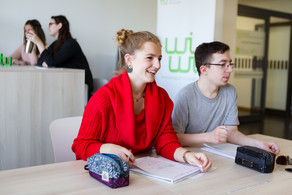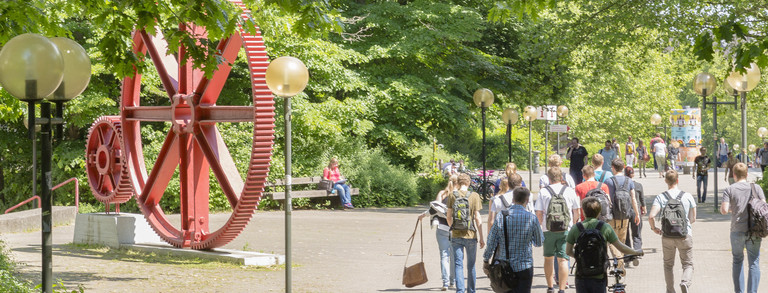DoBuS Offers for Students
DoBuS stands for "Disability and Studies" and is based at the Center for Higher Education (ZHB) at the Technical University of Dortmund. The DoBuS team is dedicated to creating equal opportunities for students with disabilities and chronic illnesses. Students with mental illnesses or partial performance disorders, such as depression or AD(H)S, can also turn to the DoBuS team with confidence.
Health impairments that can become relevant during studies are ...
- Mobility and movement impairments,
- Visual impairments/blindness,
- Hearing impairments/deafness,
- Speech impairments (e.g. stuttering),
- mental impairments/illnesses (e.g. depression, eating disorders),
- chronic physical illnesses (e.g. diabetes, multiple sclerosis, intestinal diseases),
- partial performance disorders (e.g. AD(H)S, dyslexia, dyscalculia),
- autism spectrum disorders/neurodiversity,
- other long-term impairments or serious illnesses (e.g. cancer).
The work of DoBuS is divided into two main areas:
Counseling: Here, students receive individual support to find solutions for their specific study needs. One focus is on peer exchange, in which team members draw on their own experiences of disability. Students with disabilities in their first semester (mentees) are supported in the peer mentoring program by experienced students with disabilities (mentors) during the transition from school to university.
Accessible media and assistive technology: DoBuS advises students on the use of assistive technologies to enable barrier-free digital work and participation in exams. There is also a workroom with aids and assistive technology in the DoBuS corridor in EF50, where students with appropriate needs can work at any time. DoBuS also lends out aids such as FM systems.
The provision of accessible (digital) learning environments and study materials is of great importance. DoBuS supports lecturers and other employees of TU Dortmund University in the creation of accessible learning environments and materials and implements accessible study materials for students.
You can find more information about the services offered by DoBuS here dobus.zhb.tu-dortmund.de. The study guide "Studium A-Z" (available in German only) provides information on many questions relating to studying with disabilities and chronic illnesses.
Working together for equal study opportunities!
Interview with Finnja Lüttmann, DoBuS employee in the area of accessible media and assistive technologies
Could you introduce DoBuS and its mission in more detail? Main goals and tasks?
DoBuS is the Department for Disability and Studies at TU Dortmund University. As part of the Center for Higher Education, we are committed to creating equal opportunities for students throughout the university. In other words, we support students with disabilities and chronic illnesses so that they can study whatever they want. In order to be able to study, it is possible, for example, to apply for compensation for disadvantages. In counseling situations, we support students in the application process for compensation for disadvantages.
We also take advantage of the fact that we know many students who have the same experiences and bring them together in group situations and peer mentoring. We also advise students and all other members of the university on the topic of (digital) accessibility. For students with visual impairments and blindness, for example, we make study materials accessible, and we offer workshops on the same topic for teaching staff so that materials can be made accessible from the outset in the future. In this way, we are constantly moving closer and closer to the goal of an accessible university with equal opportunities.
What are the most common challenges faced by students with disabilities and chronic illnesses, and how does DoBuS support them?
That's difficult to summarize. There are very different challenges, depending on the impairment or chronic illness and the subject being studied. Roughly speaking, it is very often a matter of finding out in a joint discussion what measures can be taken to compensate for the disadvantage caused by the impairment or illness.
What types of counseling services does DoBuS offer for students who need support?
DoBuS advises on all matters relating to the organization of studies with a disability or chronic illness. These include, for example, disability-related difficulties in courses or examinations, disability-related requirements for a stay abroad during your studies, returning to your studies after a long break for health reasons, as well as social and personal stress situations during your studies.
There is also the area of accessible media and assistive technologies. Here we advise students with visual impairments and blindness as well as reading disabilities and mobility impairments, e.g. on how to use assistive technologies.
How does DoBuS support students in using these assistive technologies effectively? Are there training or workshop offers?
Yes, if it becomes clear during the consultation that students need training, we offer appropriate workshops. These are often training courses on how to use their own assistive technology, e.g. a screen reader or a Braille display. But with the sudden switch to digital teaching at the beginning of 2020, we also trained students on how to use Zoom or how to use Moodle. We are always open to requests for training on other topics.
Is there a nice event that you like to think back on?
I like the day-to-day work with the students and employees of the TU, but it is always special for me when students write to me to say that they no longer want to receive emails from me because they have graduated.






